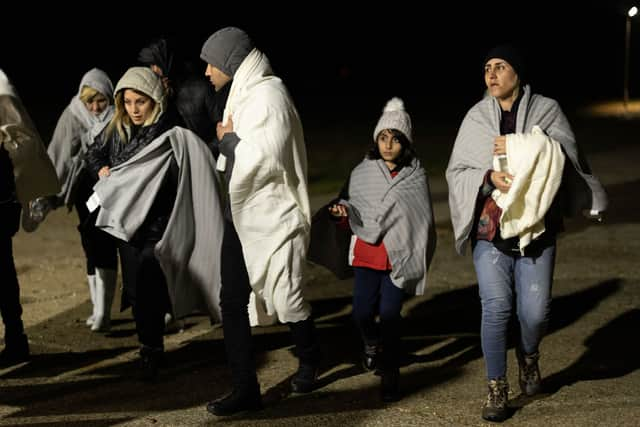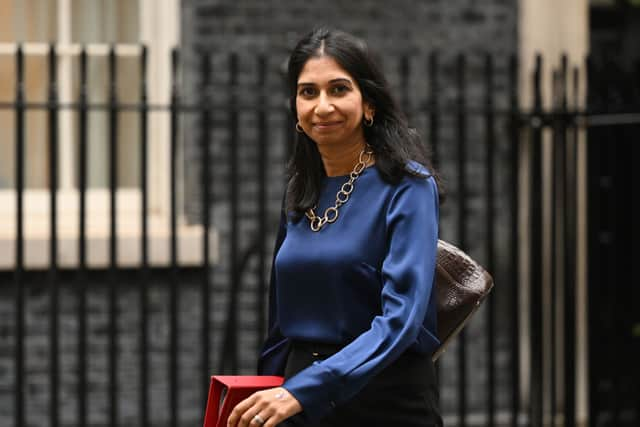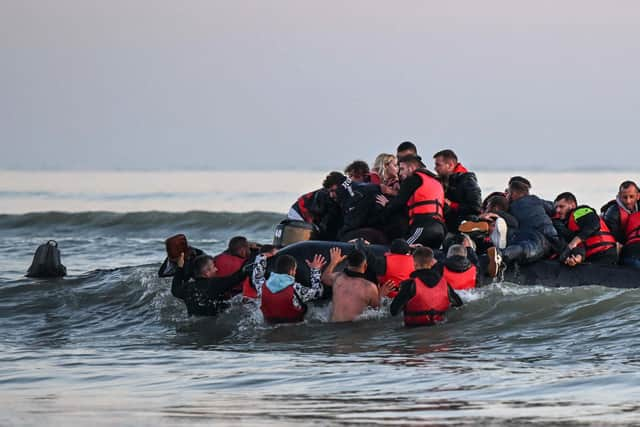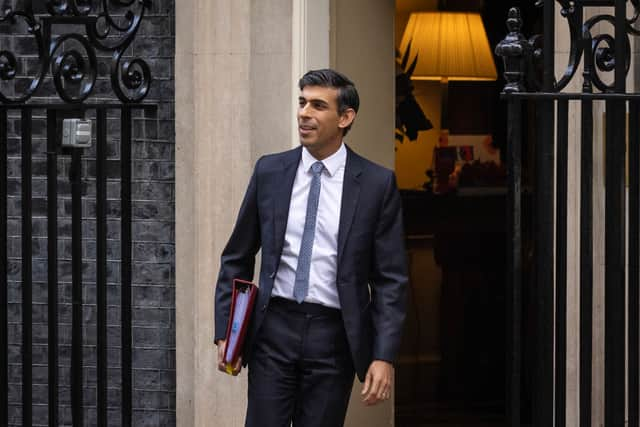UK immigration: what Suella Braverman said about new plans for asylum seekers - and are they legal?
and live on Freeview channel 276
Suella Braverman is considering her toughest crackdown on asylum seekers yet as she vows to do “whatever it takes” to tackle the migration crisis.
Writing in a foreword to a report which calls for an annual limit of 20,000 people arriving in the UK through resettlement routes, the Home Secretary claimed Brits are “fed up with the continued flouting of our laws and immigration rules to game our asylum system”. She added that the “persistent abuse of human rights laws” that prevents the removal of migrants who have “no right to be in the UK” must end.
Advertisement
Hide AdAdvertisement
Hide AdIt comes as provisional figures show that 44,000 people have arrived in the UK in the past year - marking a dramatic increase on the 28,500 who did so throughout the entirety of 2021 - with total net migration also expected to hit 504,000. Braverman and Prime Minister Rishi Sunak are therefore understood to be finalising a plan which will “deliver the operational and legislative changes necessary to comprehensively tackle this problem” - but have not yet announced official new measures.
Therefore, Braverman contributing so publicly to a report on migration before the government itself has formalised its own position is a rare move from a cabinet minister. Although the Fareham MP did highlight that she does not agree with all of the policies suggested by the Centre for Policy Studies (CPS), her foreword has nevertheless been taken by many as a general endorsement of the recommendations outlined - likely because many of them are not far removed from her previous comments on the topic.
The report, which was written by Nick Timothy, a former advisor to Theresa May, and supposedly modelled on Australia’s ‘Operation Sovereign Borders’, recommends:
- Indefinite detention of all asylum seekers who enter the country illegally.
- Legislation barring migrants who enter the country illegally from ever settling in Britain.
- Laws making it impossible to claim asylum in the UK after travelling from a safe country.
- All asylum seekers entering illegally to then be sent to Rwanda or other countries with whom the UK has struck an “offshoring” deal.
- Changes to human rights laws to allow detention and offshoring — including, if necessary, Britain’s withdrawal from the European Convention on Human Rights.
- A reformed Modern Slavery Act, including a ban on whole nationalities, such as Albania, using the act to claim asylum where there is widespread abuse.
- The creation of an identity database and system of mandatory identity cards.


Unsurprisingly, there has already been backlash against the proposals. Some have criticised the notion of “indefinite detention of asylum seekers”, when there are already so many issues with overcrowding, poor living conditions, and processing speeds in centres such as Manston, while others have pointed to the severity of “barring” migrants deemed to have entered the UK illegally from ever settling there.
Advertisement
Hide AdAdvertisement
Hide AdThere has been increased talk recently of the UK’s list of ‘safe countries’, when a report from The Times drew attention to UK immigration laws which dictate that asylum seekers who arrive from countries considered ‘safe’ by the Home Office can be fast-tracked for deportation. Many refugee charities disagree with the list, with the Refugee Council previously arguing that the inclusion of Sri Lanka “proves once again that the government does not take protection of refugees seriously.”
On the subject of the Modern Slavery Act, and banning people from certain nations, such as Albania, from using the act to claim asylum - NationalWorld recently revealed that more than a quarter of modern slavery victims identified in the UK are Albanian.
So there are many questions that remain regarding these new proposals - namely, will the Home Secretary actually be able to push any of these recommendations through Parliament, and are any of them legal? Here’s what we know so far.


Are the new migration proposals legal?
The measures recommended in the report by the Centre for Policy Studies would breach the 1951 Refugee Convention, a treaty which the UK signed just over 70 years ago. Under this treaty, legally, no refugee should be returned to a country where they face serious threats to their life or freedom, and, “subject to specific exceptions, refugees should not be penalised for their illegal entry or stay”.
Advertisement
Hide AdAdvertisement
Hide AdRefugee Council suggested on social media that if the UK were to move towards these sorts of policies, it would be aligning itself with the human rights approach of countries such as Russia.
CEO Enver Solomon told NationalWorld: “The policies outlined in this report would amount to the UK walking away from the Refugee Convention. The government seems intent on doubling down on the hostile environment with increasingly harsh, unworkable policies, which fly in the face of our long-standing international commitment to provide safe haven to those fleeing war and persecution, regardless of how they escape to the UK.”
He added that while the asylum system is not currently operating effectively, “the answers don’t lie in floating more punitive measures” which are “impracticable” and “completely out of step with British values.” The solutions, he argued, include creating a dedicated task force to tackle the backlog of asylum cases, and helping develop “the safe routes needed to address what is a global refugee challenge.”


Concerns have also been raised by the United Nations High Commissioner for Refugees, which has taken issue with the “critical factual and legal errors regarding the international legal status of refugees and asylum-seekers” in the report. UK Representative Vicky Tennant pointed out that there is no such thing as an “illegal asylum-seeker”, arguing both that “everybody has the right to seek asylum from persecution in another country” and “the only way to establish whether people are refugees is through a fair and efficient determination of their claims.”
Advertisement
Hide AdAdvertisement
Hide AdShe too highlighted the ways in which the suggestions do not align with the Refugee Convention, naming “the indefinite detention of those seeking asylum”, the potential “blanket ban on claiming asylum in the UK for those arriving on small boats”, and basing access to asylum “on mode of arrival or nationality” as some of the blatant breaches.
The report also called for the overhaul of human rights laws – with the UK “if necessary” withdrawing from the European Convention on Human Rights (ECHR) – to allow for the detention of asylum seekers and the offshoring of asylum claims. The most recent country to have left the ECHR is Russia, whose Parliament passed laws to end the convention’s jurisdiction in the country following on from its invasion of Ukraine.
Abandoning the EHCR is something which has been floated before by Braverman, who previously told an audience at the Conservative Party’s annual conference: “My position personally is that ultimately we do need to leave the European Convention on Human Rights. That is not government policy, I should say, government policy is to do everything we can within the convention, within the boundaries of the convention. But if that doesn’t work, then we will have to consider all options.”
It came after the European Court of Human Rights intervened to ground the government’s first flight supposed to take asylum seekers to Rwanda. Priti Patel was Home Secretary at the time, but Braverman has since said it is her “dream” to see such a flight take off.
Advertisement
Hide AdAdvertisement
Hide AdA legal challenge against the government’s controversial Rwanda asylum plan was recently heard in court. Braverman has insisted she will “deliver the Rwanda partnership at scale.”


Will the changes happen?
Number 10 has refused to “speculate” on future migration policy, but said the Home Secretary had “made clear” she did not agree with all of the report’s suggestions.
When asked if the Prime Minister thinks people who cross the Channel illegally should be able to claim asylum, a spokesperson said: “I’ve seen lots of speculation around what may or may not be further policies to be introduced. So I’m not going to speculate. We do want to do more on this area. There is policy work ongoing currently, but I’m not going to get into what is or is not being considered at this stage.”
The spokesperson also said Sunak’s also said perspective on banning those entering the country illegally from ever settling in Britain would “fall into the category of further ideas that may not be being considered by government”, adding: “I’m not going to get into all the sort of policy formulations that are being suggested. I don’t think that would be the right way to develop policy”.
On the report’s suggestions of bringing in identity cards, Number 10 said there were “no plans” at present. “As the Prime Minister said, we don’t think it’s the right way to solve the problem.”
Comment Guidelines
National World encourages reader discussion on our stories. User feedback, insights and back-and-forth exchanges add a rich layer of context to reporting. Please review our Community Guidelines before commenting.
